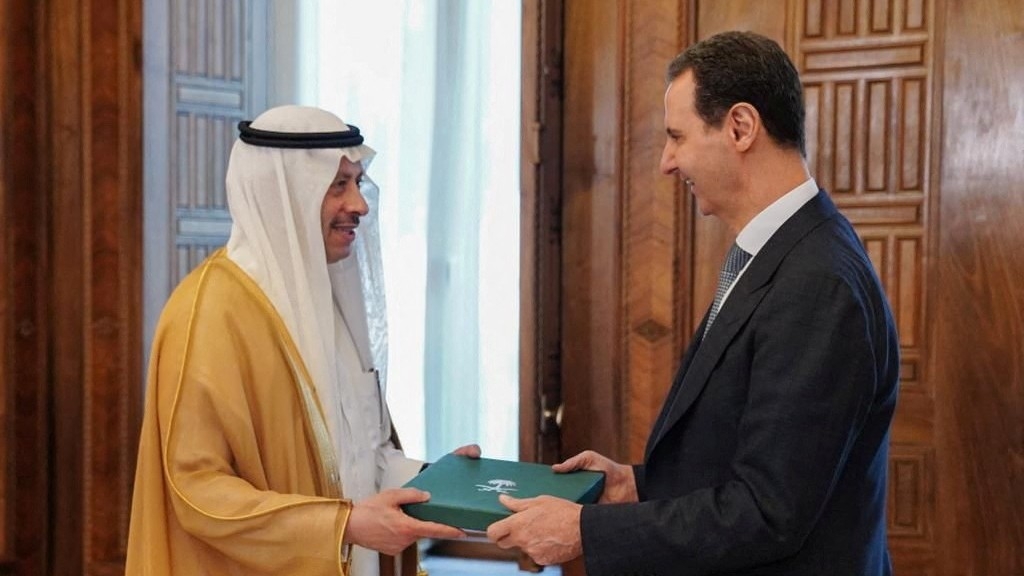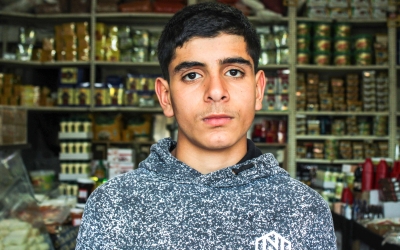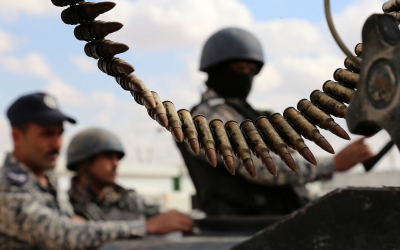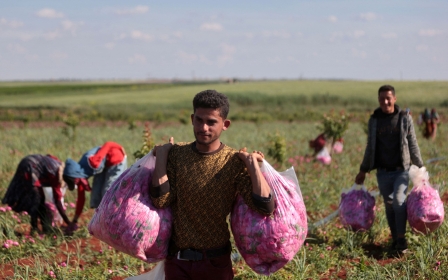Syria is back in the Arab League. So what next?

After an 11-year hiatus, Syria is finally back in the regional fold as foreign ministers from countries in the Arab League adopted a decision to readmit the war-torn country to the bloc.
Normalisation efforts propelled by the UAE and Saudi Arabia have sped up dramatically in recent months, with a flurry of diplomatic activity.
On Monday, Syrian officials participated in their first Arab League event in a decade, preparing for a summit in Saudi Arabia’s Jeddah.
"I... take this opportunity to welcome the Syrian Arab Republic to the League of Arab States," Saudi Finance Minister Mohammed al-Jadaan said at the meeting.
The reinstatement signals a full circle, considering that a mere decade ago Syrian opposition leader Moaz al-Khatib addressed the world from Syria’s suspended seat at the Arab League, calling for western support in the fight against the then-wobbling government of President Bashar al-Assad.
The developments have been very satisfying for the government in Damascus, which is heavily sanctioned and presides over a divided and impoverished country. A Syrian official familiar with normalisation talks said they also provided hope.
“Syria’s official return to the Arab fold has been boosted and propped up by warming ties with Saudi Arabia,” the official, who spoke on condition of anonymity, said. Riyadh, the official noted, was a “deciding factor” in the original decision to expel Syria.
“This highly symbolic event is not just the beginning of a period of stronger Syrian-Arab relations, but it is Syria coming back to its rightful place in the region.”
The symbolism is undeniable. But the agreement comes with caveats: pressure is on Syria to tackle drug trafficking and work towards a political amnesty that can help draw its conflict to a close and ease it back into the international community.
Questions remain whether any boons will be felt by Syrians in the short and medium term.
Syrians hopeful for improvement
The twin earthquakes in Turkey in February devastated much of northern Syria. The World Bank estimated the disaster caused $5.1bn in direct physical damage.
“The current value of the damaged and destroyed capital stock is estimated at about 10 percent of gross domestic product,” the World Bank said.
Yet the quakes also rapidly sped up the normalisation process, with Arab states flying in aid and creating a precedent for engagement and investment that many Syrians in government-held areas hope will continue.
Sahar Mesto, 22, is a student at Damascus University. She feels the re-admission is a boost for the isolated and war-torn country.
“It’s certainly a step in the right direction. Syria has been ignored and neglected for too long, the currency is in a bad state and work is hard to find,” she said.
“So many people are unemployed because the salaries can’t even cover transport, let alone the cost of basic living. If Arab countries start [to restore ties] it will help the economic situation drastically.”
Mesto studies English literature, but worries about how to find a well-paid job in Damascus as the Syrian lira falls even further, now at 8,500 per US dollar, an all-time low.
“We’re all stuck in the same boat. Government salaries are stable but too low, and working in the private sector, in translation or media, isn’t much better,” she said.
“Many colleagues I know have left to [go to] the UAE and other countries. But it’s expensive to move out from Syria, not everyone has the financial capacity to be able to make that move.”
Work to be done
The editor-in-chief of pro-government daily al-Watan urged Syrians to not go overboard with the announcement of a return to the Arab League, given that it would take time to fully repair relations.
“The return of the Arab League to Syria does not mean that the war is over or that billions for reconstruction will reach us within weeks. This is a political victory for President Assad,” Waddah Abd Rabbo posted on Facebook.
“It is a transgression against the past and the opening of a new page in the bilateral relations between Syria and a number of Arab countries. It is the beginning of the end of the war, not the end. Every Syrian can be optimistic that what is to come is better.”
Work still needs to be done with several Arab countries, however.
'The return of the Arab League to Syria does not mean that the war is over or that billions for reconstruction will reach us within weeks'
- Waddah Abd Rabbo, Editor-in-chief, al-Watan
Though Saudi Arabia said it is resuming its diplomatic presence in Syria immediately and has invited Assad to an Arab League summit in Jeddah on 19 May with the blessing of the bloc’s secretary-general Ahmed Aboul Gheit, others have been more circumspect.
Qatar, a firm opponent of Syria’s readmission, refused normalisation without a broader political solution to the conflict and refrained from sending its foreign minister to last week’s gathering altogether.
The US position was equally strong, with a spokesperson saying: “We do not believe Syria merits readmission into the Arab League at this time,” adding that US sanctions would remain in full effect.
Meanwhile, the Syrian opposition said they have been sidelined entirely. Bader Jamous, a senior Syrian opposition figure, said: “It’s a shock for the Syrian people struggling for freedom, democracy and justice. We haven’t been consulted about this, and it appears to be a clear disregard for the Syrian people’s demands.”
Narco issue
One of the central issues discussed in the Arab League foreign ministers' meeting was Syria’s highly problematic drugs trade - in particular, the notorious amphetamine Captagon, which in recent years has been exported en masse to neighbouring countries.
A committee consisting of Saudi Arabia and Syria's neighbours Lebanon, Jordan and Iraq has been formed to follow up on the implementation of the key points agreed for Syria’s return, including amnesties, facilitating the return of the displaced, ending drug smuggling and reigning in Assad’s backers Russia and Iran.
For neighbouring countries such as Jordan, the issue of the cross-border narcotics trade is of vital importance. Syria’s readmission comes on the heels of a Jordanian initiative laying out a roadmap for ending Syria’s conflict.
Syria has promised to cooperate with Amman to identify and root out drug smuggling, though people close to the Syrian government are accused of being behind the highly lucrative Captagon trade. Syrian officials and relatives of Assad have been sanctioned over narcotics, though they deny any involvement.
Barely days into the agreement and action has already been taken to brutal effect, with Jordanian air strikes hitting Syria to kill a major narco-baron.
Although Amman remained tight-lipped on the matter - possibly due to the attack being on foreign soil - drugs kingpin Marai al-Ramthan and his six children and wife were killed in the raids which took place in eastern Sweida.
Saudi Arabia, similarly, has a huge desire to end Captagon inflows. Riyadh has reportedly offered Syria $4bn to compensate the loss of earnings from the trade, though it denies this.
Regardless, Saudi Crown Prince Mohammed bin Salman is keen to put an end to instability on his kingdom’s borders and pave the way for prosperity, said Kamal Alam, a non-resident senior fellow at the Atlantic Council.
"It is common knowledge that this step is a comeback for Assad. In actuality, he never left. Unofficially there have always been personal links between Riyadh and Damascus through the highest intermediaries,” Alam told MEE, saying these contacts only grew when Mohammed bin Salman became crown prince in 2017.
“Similarly, the business community of Damascus, Homs and Aleppo have old familial and running trade ties to various Saudi family offices."
Mohammed bin Salman, Alam said, wants “zero problems” on his borders that could disrupt plans for his Vision 2030 economic diversification campaign.
“He wants a stable Lebanon and Iraq, and even in a weakened Syrian state, President Assad and his network have ability to control Lebanon and influence Iraq just as he did after former Saudi King Abdullah broke the ice after the Hariri assassination,” Alam said.
“So with Damascus, the Saudis get a lot more than just Syria. They get a regional package, including the Palestinians."
This article is available in French on Middle East Eye French edition.
Middle East Eye propose une couverture et une analyse indépendantes et incomparables du Moyen-Orient, de l’Afrique du Nord et d’autres régions du monde. Pour en savoir plus sur la reprise de ce contenu et les frais qui s’appliquent, veuillez remplir ce formulaire [en anglais]. Pour en savoir plus sur MEE, cliquez ici [en anglais].






